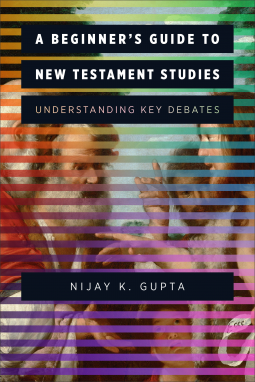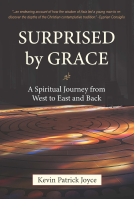
A Beginner's Guide to New Testament Studies
Understanding Key Debates
by Nijay K. Gupta
This title was previously available on NetGalley and is now archived.
Send NetGalley books directly to your Kindle or Kindle app
1
To read on a Kindle or Kindle app, please add kindle@netgalley.com as an approved email address to receive files in your Amazon account. Click here for step-by-step instructions.
2
Also find your Kindle email address within your Amazon account, and enter it here.
Pub Date 17 Mar 2020 | Archive Date 27 Mar 2020
Baker Academic & Brazos Press | Baker Academic
Talking about this book? Use #ABeginnersGuidetoNewTestamentStudies #NetGalley. More hashtag tips!
Description
Advance Praise
“This ‘beginner’s guide’ is marked by a wise choice of crucial, controversial topics, accurate sketches of the perspectives of the major thinkers on the topics, judicious and open-handed appreciation of all there is to be learned, and, at the same time, student-sensitive reflections on how each topic matters for life and ministry. Bravo!”—Scot McKnight, professor of New Testament, Northern Seminary
“Nijay Gupta is true to his title in A Beginner’s Guide to New Testament Studies. His writing is thoroughly accessible and highly engaging, and it doesn’t presume prior knowledge of the field of New Testament studies. Gupta provides a bird’s-eye view of key issues in the field—from the historical Jesus, to Paul and the law, to New Testament application today. Gupta fairly portrays scholars on different sides of an issue and provides a final reflection of his own for each chapter. For anyone wanting an entrée to New Testament studies, this is the book for you.”—Jeannine Brown, professor of New Testament, Bethel Seminary, San Diego and St. Paul
“Right off the bat, I was asking myself into which of my classes I could incorporate A Beginner’s Guide to New Testament Studies: Understanding Key Debates. As I continued reading, however, I soon began to wonder if it was possible to incorporate it into all of them. With each chapter I read, I honestly thought, This chapter alone is worth the price of the book. The content is clear and evenhanded and is as comprehensive as possible while remaining appropriately concise. In addition to that, it’s remarkably relevant, engaging, and fun.”—Joseph R. Dodson, Denver Seminary
“Surveying the issues of debate in New Testament studies can be a daunting task. Fortunately, Nijay Gupta has taken complex topics and laid them out in a palatable way, one that even the novice can understand and appreciate. Gupta offers a fair and balanced presentation of some of the main arguments for various points of debate within New Testament scholarship. In the end, the reader is left with an effective roadmap for navigating the rich and intricate field of New Testament studies.”—Jeanette Hagen Pifer, assistant professor of New Testament, Talbot School of Theology, Biola University
“This is a really helpful book. As an undergrad professor, I am often looking for a brief introduction to contested issues in New Testament studies that explains our academic debates to students in an accessible way. Dr. Gupta does this time and again in this work. He tackles issues like women in leadership, justification, and pseudonymity in a way that is charitable and clear. This will be a welcome resource to supplement New Testament introductions, which often lack the space to deal with issues in detail.”—Esau McCaulley, assistant professor of New Testament, Wheaton College
“Nijay Gupta has produced an accessible and helpful resource for students who are seeking to grasp the contours of scholarly debates on several key issues in New Testament studies. He presents a fair and balanced treatment of diverging opinions and whets the reader’s appetite vis-à-vis the issues discussed.”—Abson Joseph, academic dean and professor of New Testament, Wesley Seminary, Indiana Wesleyan University
“In A Beginner’s Guide to New Testament Studies, Nijay Gupta demonstrates the skill of a master guide as he takes readers on a fast-paced tour of the world of New Testament studies. This volume doesn’t shy away from the complexity of critical New Testament debates and yet manages to offer concise, accessible overviews that invite further study and reflection. Nijay’s pastoral sense is also evident as he anticipates the challenges presented by popular (mis)perceptions of the New Testament (in church and culture). A new generation of students will find that Nijay has demystified some of the most contested areas of scholarly debate and provided them with the opportunity to navigate their own course in studying the New Testament.”—Ronald Herms, dean, School of Humanities, Religion, and Social Science, Fresno Pacific University
“A concise and accessible guide with salient details for beginners. The short chapters aptly expose students to the main issues and differing views among scholars, and each concludes with questions for critical reflection—questions that may be reappropriated for online, in-class, or small-group discussions. An excellent book for undergraduate students.”—Daniel K. Darko, professor of New Testament, Gordon College
“What do New Testament scholars think about the historical reliability of John’s Gospel? What is the relationship between the historical Jesus and the apostle Paul? What is the New Testament’s view of women in leadership roles? What is the center of Paul’s theology? Do Paul’s statements about the Jewish law have any coherence? Who really wrote Jude, 2 Peter, or the Pastoral Epistles? Is the New Testament silent on the Roman Empire or does it engage in a veiled but powerful critique? It would take beginning students a lifetime to answer these questions! Or they could just read this book. Gupta has a detailed grasp of the New Testament, its sociocultural world, and the history of New Testament interpretation, and he communicates in remarkably accessible prose, providing an ideal entry point for students seeking a way in to the field of New Testament studies.”—Joshua Jipp, associate professor of New Testament, Trinity Evangelical Divinity School
Available Editions
| EDITION | Other Format |
| ISBN | 9780801097577 |
| PRICE | US$24.99 (USD) |
| PAGES | 208 |
Featured Reviews
I appreciate the accessibility and of this text. As a sometimes church curriculum writer, I value writers who can talk about complex theological ideas in sensible ways. Highly recommended.
 Christian W, Reviewer
Christian W, Reviewer
My review of A Beginner’s Guide to New Testament Studies: Understanding Key Debates by Dr. Nijay Gupta.
What does this book offer the Church?
As I mentioned in my review of The State of New Testament Studies, a student looking to enter the field of New Testament studies will find themselves awash in a myriad of debates, lost in a sea of jargon, and drowning in an ocean of material. Where would you start? And, even if you got started, where would you go from there?
This is where Dr. Nijay Gupta comes in to help the prospective student. In this book, Dr. Gupta introduces prospective students to the vast world of the New Testament field. Rather than giving students in-depth information on each subject, the book introduces the concept, gives a few views on the concept, and then provides a final reflection on how to properly think about the subject and how to navigate the field if you wish to pursue the subject more deeply.
The book can be grouped into a few sections, a lot that would be familiar to students in a graduate program. Students interested in the gospels can read about the Synoptic Problem, an overview of John and how it relates to history, the historical Jesus discussion, and how Jesus and Paul interact. Those interested in reading about Paul learn about his theology and his relation with Torah. A few other interesting topics include the New Testament use of the Old Testament, how to apply Scripture, and understanding the New Testament in its context. There are a few more subjects addressed, but I think these might be of the most interest to those at the onset of their studies in these fields.
How successfully does it meet its goals?
I mentioned before that this book is similar to another book by Dr. Gupta, The State of New Testament Studies. What’s the difference between these two?
First, they are written for different people. The current volume is addressed for people who don’t have much of a familiarity with most of New Testament studies at all, or who only have a knowledge of a handful of subjects. The previous volume was written more as a supplemental guide for those who might be somewhat familiar with these topics, but would like to go a bit deeper. In that case, this book is an excellent primer for those who are getting started on their journeys, or for those who may be deciding what to study in the future.
Second, they are written at different “knowledge” levels. The current volume is written in such a way that it avoids jargon or avoids the reader having some sort of pre-foundational thoughts on the topic. The reader will have their hand held the entire way through. The previous volume is written for those with an understanding of the subject, but want to go deeper with someone conversant in the subject. I have a hard time judging the success of this endeavor, as I am familiar with the subjects and found this book very, very easy to follow. I would be curious how a layperson without a seminary degree would handle this, but I think it would be easy enough to learn, even if it required a bit of extra work.
All in all, I think this book is an excellent primer to someone who is thinking about pursuing a higher theological education, or for someone who has previously earned a degree but would like to follow the debates a bit more closely. For pastors or ministers working with students, or for those who would like to study a bit more deeply even if not pursuing a degree, will find a lot in this book. I would be curious how they could apply it to their congregations, but it might trigger more advanced studies for a pastor/minister and open doors for them to help their congregation go deeper into theology.
You can read more information about the book on the Baker Publishing Group’s website. You can pre-order the book ahead of its March release at Amazon, Barnes and Noble, Christian Book, or speak with your local bookstore about getting it when it comes in!
 Bronwyn D, Reviewer
Bronwyn D, Reviewer
As a Biblical studies amateur, I found this book so useful in examining a wide range of topics in a balanced and thorough way. It helped illuminate issues that are debatable, but often not clearly explained in discussions of biblical topics. The book is easy to read, and carefully thought out. While the author has opinions on the topics, he presents both sides in a fair and even way. The author also provides a helpful reading list at the end of each chapter, graded from beginner to advanced. I would recommend the book to anyone interested in the Bible, whether they are exploring contemporary scholarship or would merely like some background information to consider.
 Conrade Y, Reviewer
Conrade Y, Reviewer
Anyone thinking of picking up this book needs to know that it is about biblical scholarship rather than a layperson's guide to basic New Testament books. It is not popular debate over the New Testament nor about a survey of the 27 books of the New Testament. It is essentially about scholastic debates within the realm of NT biblical scholarship. Meant primarily for beginner students of New Testament scholarship, it summarizes many of the important controversies surrounding the subject. Controversies such as the which gospel is the earliest; whether some of the gospel writers had copied from an anonymous source named Q; how the synoptic gospels differ from John; authorship of some New Testament books; the view of Paul and Jesus; etc. These and many more form a primer for theological studies in the New Testament.
Author and professor Nijay Gupta summarizes the general issue before giving us various perspectives surrounding it. He is careful not to be dogmatic about the issue, choosing instead to lay out the basic ideas and points of view before giving a personal take on it at the end. For the new NT student, this book is a godsend. It is like a special edition of "New Testament Studies for Dummies." With this clear guide, New Testament students can grasp quickly the history and context of the matter concerned. The key debates include:
1) Understanding the Synoptic Problem
2) Perspectives surrounding the Search for the Historical Jesus
3) The Fourth Gospel
4) Relationship Between Jesus and Paul
5) Paul's Theological Perspective
6) Paul and the Jewish Law
7) Interpreting Revelation
8) Pseudonymity, Authorship and Authority in the New Testament
9) The New Testament and the Roman Empire
10) Women in Leadership in the New Testament
11) Justification by Faith vs Judgment by Works
12) The Old Testament in the New Testament
13) Application and Use of Scripture
Three Thoughts
=================
First, I must say I wish I had this book when I was in seminary. I enjoy the way Gupta introduces the issue, and gradually bringing in the different ideas surrounding it. By incorporating elements of his own teaching experience with regard to these studies, one would feel like being in a classroom with the author as professor! This book brings back a lot of memories from my seminary years. I remember having to grapple with the various debates and multiple perspectives on topics that seemed quite foreign. Why study the synoptic problem? What's the big deal with regard to the research controversy surrounding the historical Jesus? Surely, there is just one perspective of Paul, that is, Paul's!
Second, this book is not for everyone. For those who are not familiar with theological terms or seminary level education, they might find the studies more philosophical and technical. Some might even say that such debates are a waste of time. If that is your position, then such topics are not for you, at least for the moment. This is an academic treatment, not a Bible-Study type of book. While there are instances of Bible study, the way the Scripture is used tend to be meant for argumentative or illustrative purposes. Chapter 13 however speaks to most of us in terms of how we can apply and use Scripture. Of all the chapters, the general reader might appreciate this last chapter the most as it is not just a summary but an overview of the different ways we apply and use the Bible.
Third, readers will appreciate the author's gentle leading through the different facets of arguments and debates. Gupta does a great job in helping us sift through the maze of perspectives. Without feeling forced to choose a side, we are given an opportunity to understand the controversies. Good scholarship needs to be open and this is what Gupta has done. Like a good professor, he includes some resources for advanced studies as well.
Nijay K. Gupta is Associate Professor of New Testament studies at Portland Seminary in Portland, Oregon. His research interests include Biblical theology, biblical hermeneutics and exegesis, Pauline literature, the Gospel of John, and New Testament ethics.
Rating: 4.5 stars of 5.
conrade
This book has been provided courtesy of Baker Academic and NetGalley without requiring a positive review. All opinions offered above are mine unless otherwise stated or implied.
 Janet P, Reviewer
Janet P, Reviewer
This book is essentially a textbook and roadmap for further reading on the subject. Gupta has an even-handed treatment of major issues in the subject.
In each chapter he presents the topic, often in great detail, then he goes on to cover two (or more) opposing views of the subject. The chapter then has a lengthy reflection synthesizing the viewpoints and looking at the subject in greater depth. The chapters end with a conclusion and a list of books for suggested reading.
The first few chapters cover the books themselves, although he does not deal with Acts or the letters written by other authors than St. Paul. The remaining chapters, about 2/3 of the book, cover specific issues including authorship, politics, and the Old Testament.
His viewpoint is pretty neutral and Protestant, although Catholic scholars will find much of value.
Readers who liked this book also liked:
Brian Azzarello; Chris Condon; J. Holtham; Stephanie Phillips; Jason Aaron; Tyler Crook; Matt Kindt; Corinna Bechko; Jay Stephens; Amy Roy
Comics & Graphic Novels, Horror





